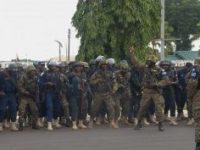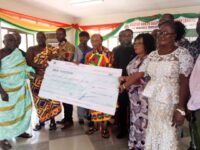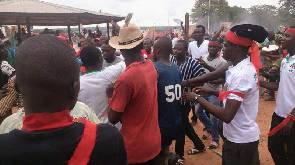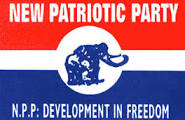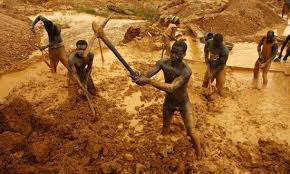 The Upper West Regional House of Chiefs has expressed worry over the rising interest and the acquisition of mining concessions in the Upper West Region. According to the chiefs, most of these concessions were granted without the involvement and consultations of traditional authorities.
The Upper West Regional House of Chiefs has expressed worry over the rising interest and the acquisition of mining concessions in the Upper West Region. According to the chiefs, most of these concessions were granted without the involvement and consultations of traditional authorities.
A statement from the Regional House of Chiefs pointed out that the situation is rapidly destroying their land, water, agriculture and sacred natural sites.
It is also negatively impacting the lifestyle of youth in communities such as Charikpong and Danyorkura.
The chiefs are therefore calling on the Minister of Lands, Forestry and Mines to as a matter of urgency, “place a moratorium on the operations of mining companies in the Upper West Region.”
Read below the full statement
STATEMENT OF THE UPPER WEST REGIONAL HOUSE OF CHIEFS ON MINING IN THE UPPER WEST RGION
THE HON MINISTER
MINISTRY OF LAND AND NATURAL RESOURCES
ACCRA
We, Traditional Authorities (Namine/Kuore, Tengandeme, Pognamine and Halakuore) of the Upper West Region have been following with keen interest the events on Gold mining in the Upper West Region.
We have observed with deep worry, the rising interest and the actual acquisition of mining concessions in the Upper West Region. Between February 2005 and January 2013, a total of 28 mineral concessions of various categories have been issued to large scale mining companies with a majority of them being Australian mining companies.
It is sad to note that most of these concessions were actually granted without the involvement and consultations of Traditional Authorities.
Since the advent of reconnaissance, prospecting and exploration work by these large scale mining companies in the Upper West Region it has witnessed the highest incidence of illegal mining which is very fast destroying the land, water, agriculture, sacred natural sites and lifestyle of young boys and girls in communities such as Charikpong, Danyorkura and many more. Most of these communities have since not known peace with the increasing crime and deteriorating social cohesion. We use the occasion to pledge our commitment to collaborate with the appropriate stakeholders to nip “galamsey” in the bud The operations of Azumah Resources Ltd since 2007, has been a source of worry to the people of the affected communities and their leadership, both traditional and formal. As we speak, the House has received countless communications of complaints from groups and individuals concerning and not limited to issues of noncompliance to the procedural and substantive elements of the laws governing the mining sector.
The House has failed to find any evidence of effective consultation with affected Communities, Traditional Authorities and District Assemblies in the areas where Azumah Resources Ltd operates.
We arrived at this conclusion based on failure to find evidence of the most comprehensive treatment of the procedural and substantive elements of Free Prior Informed Concept (FPIC) as contained in the International Finance Cooperation (IFC) Performance Standard 7 which refers to the International Labour Organization (ILO) Convention 169 and the United Nations Declaration on the Rights of Indigenous Peoples.
“FPIC” will be established through good faith negotiation between the client and the Affected Communities of Indigenous Peoples.
The client will document: (i) the mutually accepted process between the client and Affected Communities of Indigenous Peoples, and (ii) evidence of agreement between the parties as the outcome of the negotiations” (paragraph 12) Complaints have reached the Upper West Regional House of Chiefs from the following sources
The Chiefs and Elders of Charekpong
The Charekpong Development Committee
The Nadowli District Assembly (Secretariat)
Honourable Assembly Women and Men of the Nadowli/Kaleo and
The Upper West Coalition on Mining
We live in an already fragile ecosystem. Notable among the myriad of environmental problems in Northern Ghana include the advancing desertification, annual floods and droughts, depleting soils and vegetation cover, siltation of water points, rising temperature and the loss of biological diversity. This has resulted in low agriculture productivity, low income levels, hunger, disease and migration of the youth out of the region. It is therefore not surprising that the three Northern regions are always found at the bottom of poverty statistics in the country.
In response to these challenges, NGOs, and Civil Society Organizations have been at work to reduce and eventually reverse the hardships inflicted on the people in Northern Ghana.
The Government of Ghana and its development partners have equally responded to these challenges through major interventions such is the Ghana Environmental Management Program (GEMP), the Northern Rural Growth Program (NRGP) and Savannah Accelerated Development Authority among others. Most of these interventions, both by Government and NGOs are strategically developed around reversing the environmental conditions predisposing Northern Ghana to high economic and social vulnerability.
We have been compelled by the rising tension between communities and company in the areas affected by mining in the region to intervene in this matter. We do this because as traditional authorities we are responsible, by our mandate, for the ancestral and spiritual wellbeing of our communities. We live with and experience the difficulties and sufferings our communities go through every day to make ends meet.
We are by this statement calling on the Minister of Lands, Forestry and Mines to as a matter of urgency, place a moratorium on the operations of mining companies in the Upper West Region.
We are committed and open to resume discussions towards arriving at: A collective, open and informed process in determining the development need of the Upper Wet Region and whether mining is one of them at all. A mutually accepted process between the c companies and affected Communities of Indigenous Peoples, and Evidence of agreement between communities and mining companies operating in the Upper West Region and documented outcomes of the negotiations to prevent the exploitation and abuse of the fundamental rights and freedoms of our people.
We think the time to act is now
THE HON RGIONAL MINISTER
UPPER WEST REGION
WA
THE HON MINISTER
MINISTRY OF ENVIRONMENT, SCIENCE AND INNOVATION –
ACCRA
CHIEF DIRECTOR
ENVIRONMENTAL PROTECTION AGENCY
ACCRA
THE REGIONAL DIRECTOR
ENVIRONMENTAL PROTECTION AGENCY
WA
THE WA DISTRICT OFFICE
MINERALS COMMISSION
WA
